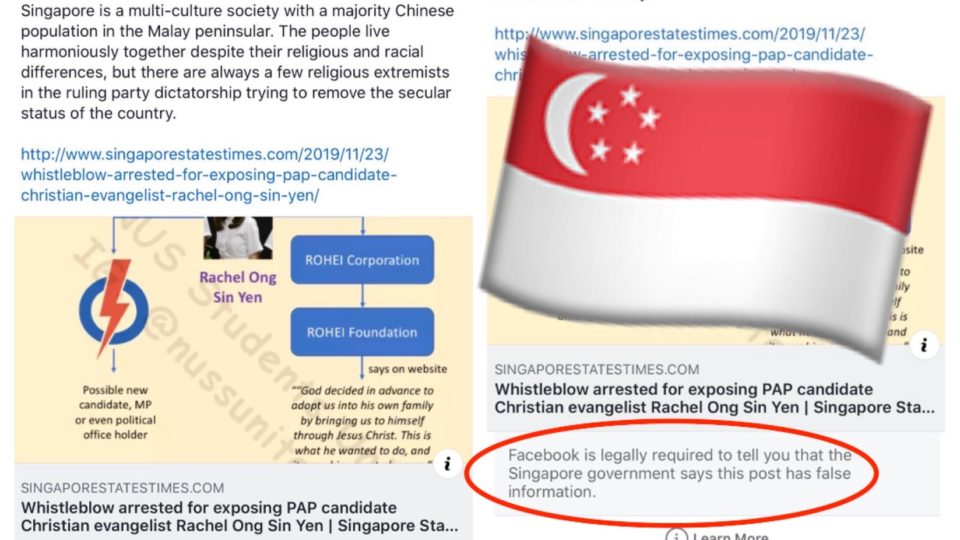Facebook has yielded to Singapore’s “fake news” law by issuing a correction on a controversial post by States Times Review, after its dissident editor refused to comply with a government order.
The correction on the “offending” Facebook post is visible on the bottom, under the article title, as of Saturday afternoon for Facebook users in Singapore. The notice reads: “Facebook is legally required to tell you that the Singapore government says this post has false information.”
However, the notice did not appear during attempts to access the post abroad, from Indonesia, Australia, and the US.
The Facebook post at the center of it all, published by the anti-government States Times Review on Saturday, alleged that Singapore’s ruling political party was “fielding a Christian evangelist” in the upcoming general elections. The post also claimed that authorities had arrested a whistleblower for exposing the candidate’s religious affiliations.
Singapore authorities fired back on Thursday, ordering editor Alex Tan Zhi Xiang to put up a correction on his post containing “scurrilous accusations” of election rigging.
Tan — who is based overseas — did not play along, saying he is an Australian citizen and would not comply with requests from a “foreign government.”
But it appears Facebook has succumbed to the law, with its Saturday notice.
A link on the Singapore Government’s Factually website (Ed. Note: this also couldn’t be accessed abroad) goes into great detail, enumerating and refuting all the things in the States Times Review’s post that needed correction and clarification.
“These claims are false and baseless. No one has been arrested or charged arising from the NSU post,” according to Factually.
Tan claims he learned about the so-called arrest he wrote about from a tip and in a separate post, said he had not received a takedown request from police in Australia.
He is originally from Singapore but says he obtained citizenship in Australia back in 2016, the same year the founder of a previous website Tan wrote for was convicted of sedition and jailed for articles he published.
“I am happy to go to 10 years’ jail for it, so there shall be no compliance. I will defy and resist every unjust law … the site is based in Australia and it obeys only Australian jurisdiction. No foreign government orders or censorship demands will be acceded with,” Tan wrote.
The “fake news” law was applied for the first time on Monday, as Singapore ordered opposition party member Brad Bowyer to correct a Facebook post authorities said could “smear the reputation” of two state investment funds.
Singapore has gotten a lot of flak from tech giants and watch groups over concerns that the law targeting misinformation is a blow to civil liberties, but the government remains steadfast that the legislation is needed to stop the spread of damaging falsehoods online.
Critics of Singapore’s disinformation law say that it could lead to government censorship.
Facebook reps faced tough hearings in Singapore’s Parliament when the law was debated last year, with vice-president of public policy for Asia-Pacific Simon Milner growing exasperated under three hours of intense questioning from Home Affairs and Law Minister K. Shanmugam.
“We do not believe that legislation is the best approach to addressing the issue. Singapore already has a variety of existing laws and regulations which address hate speech, defamation and the spreading of false news,” Alvin Tan, Facebook’s head of public policy for Southeast Asia, wrote at the time.
Facebook’s Asia Pacific headquarters are in Singapore and the company plans to build a US$1 billion data center in the country.
This is a developing story, stay tuned for updates.
With reporting from AFP




